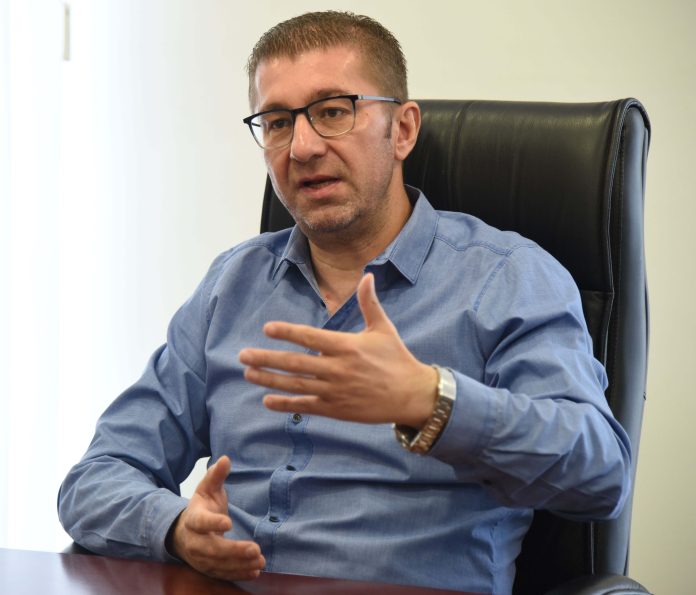The European Union loses its credibility when the megalomaniac demands of individual states are satisfied, says the leader of VMRO-DPMNE, Hristijan Mickoski in an interview with Deutsche Welle.
It was during the visit of the leader of VMRO-DPMNE, Hristijan Mickoski and the vice-president of the party, Aleksandar Nikoloski, to Budapest, where they had a meeting with Viktor Orbán – Prime Minister of Hungary and president of the sister party FIDESZ, that the European Commissioner for Enlargement, the Hungarian Olivér Várhelyi, in an interview for Euractiv, criticized the Macedonian opposition – that it passed the basic democratic red lines in acting against the French proposal.
For Macedonia, this should be a moment to sober up, also for the opposition. Burning documents in the plenary chamber, pushing people to violence, and inciting hatred bring nothing, only damage. There are very clear limits to the European way of doing politics, very clear limits to civilised politics, and my assessment is that many of those red lines were passed by the opposition, said Várhelyi among other things.
DW requested answers from VMRO-DPMNE leader Hristijan Mickoski for this criticism and for the current activities of the party.
DW: Did you pass the red lines?
I believe that the only red lines that were passed were those of the sale of the Macedonian identity, the rough trade with our historical heritage and cultural landmarks on which we as a nation build our country and cherish our identity. Knowing the European bureaucracy, I understand Mr. Várhelyi who, as a politician in the EU, wants another completed chapter on his desk, another closed issue. And at the same time, it is clear to me that from his point of view it is difficult to understand what is extremely important for us, and that is our identity and the right to exist as a small nation, and that in a situation when our neighbor has aspirations and unjustifiably blocks us, taking advantage of the weak and corrupt government, which, unable to deliver results, trades with identity features. But the commissioner should also understand that in a situation where no one from the government consulted the opposition during the drafting of the document that was adopted as a negotiating framework, when the opposition and our demands to publish the text of the protocol containing the Bulgarian megalomaniac demands were completely ignored, when a negotiating framework was accepted, according to which we have no real start of the negotiations, but an ordinary photo session and the same problems that remained, the only red line that was passed is that of common sense, of the identity recognition of Macedonia and the people, as well as the endless tolerance of the European Union of unreasonable blockades and not making progress. The European Union also loses its credibility when the megalomaniac demands of individual states are met. The only thing I want and insist on is consistent respect for the values on which the EU rests, and that is respect for diversity, for a strong appreciation of solidarity, because neither Europe nor Bulgaria will benefit more from the fact that a criminal government and conditioned politicians have fulfilled megalomaniac demands through which they brought a country and a people into a subjugated state.
DV: Was a similar message conveyed to you at the meeting with Hungarian Prime Minister Viktor Orbán, given that Várhelyi comes from the same political option?
No, the talks with the Prime Minister of Hungary, Orbán, were not in that spirit at all. On the contrary. He is a friend of Macedonia and a great supporter of strategic interests. I briefed him the details of the negotiating framework, and what bothers us, and that is the right to allow a member state of the Union to change our textbooks, our Constitution, deny our language, and in return we still are at the gates of the EU, until someone from Bulgaria says – enough deprivation of identity, now you can enter. We also discussed the situation in the region, the energy crisis and a number of other topics and issues. Friendly and cordial meeting.




Comments are closed for this post.